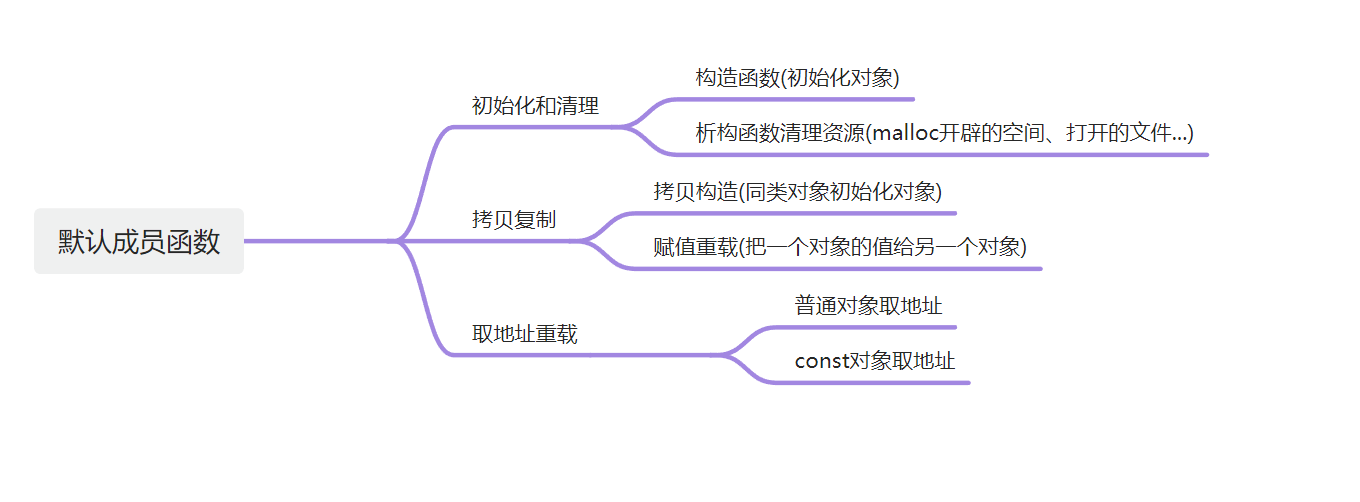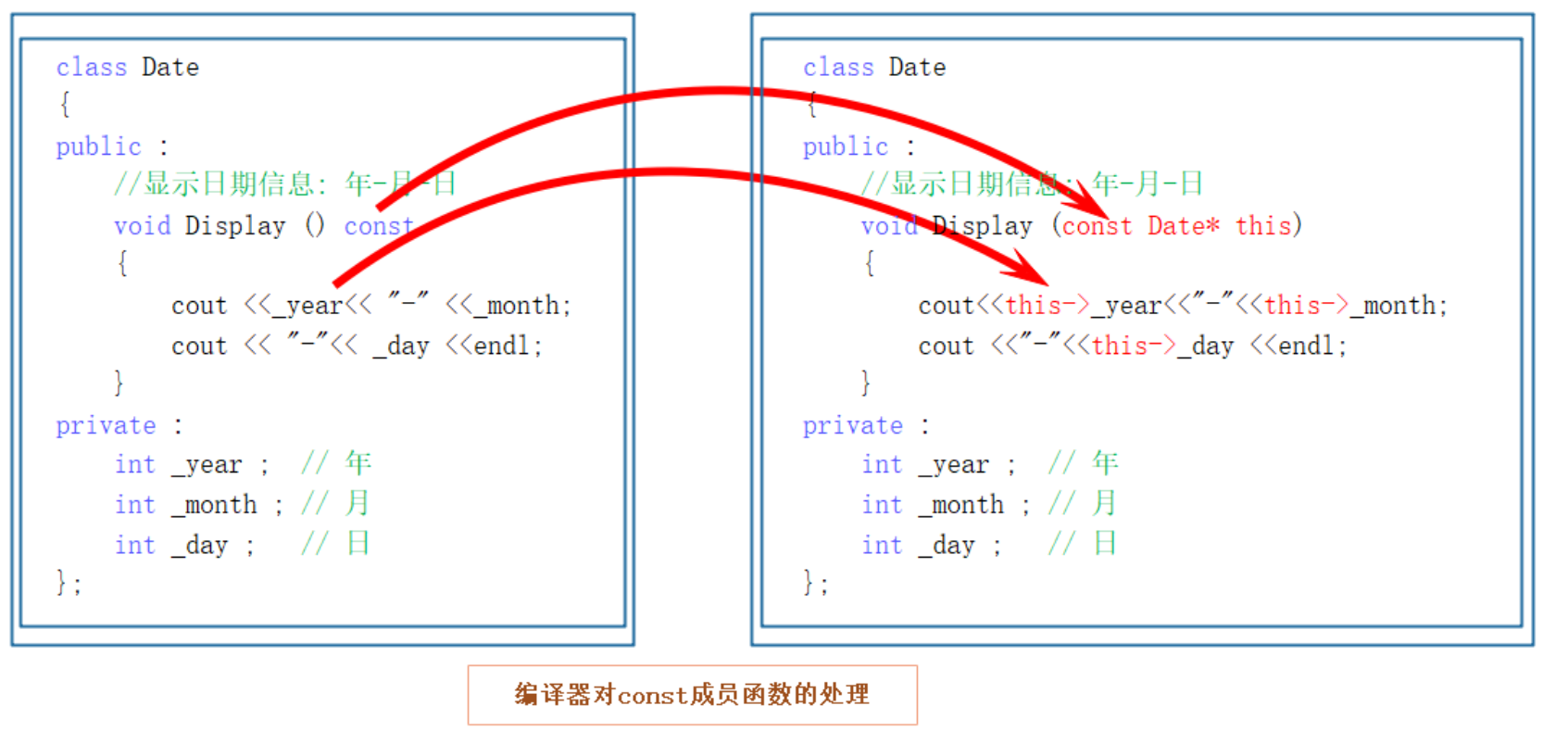本文主要是介绍C++心决之类和对象详解(中篇)(封装入门二阶),希望对大家解决编程问题提供一定的参考价值,需要的开发者们随着小编来一起学习吧!
目录
1.类的6个默认成员函数
2. 构造函数
2.1 概念
2.2 特性
3.析构函数
3.1 概念
3.2 特性
4. 拷贝构造函数
4.1 概念
4.2 特征
5.赋值运算符重载
5.1 运算符重载
5.2 赋值运算符重载
5.3 前置++和后置++重载
7.const成员
8.取地址及const取地址操作符重载
1.类的6个默认成员函数

如果一个类中什么成员都没有,简称为空类。空类中真的什么都没有吗?并不是,任何类在什么都不写时,编译器会自动生成以下 6 个默认成员函数。默认成员函数:用户没有显式实现,编译器会生成的成员函数称为默认成员函数。
2. 构造函数
2.1 概念
class Date
{
public:void Init(int year, int month, int day){_year = year;_month = month;_day = day;}void Print(){cout << _year << "-" << _month << "-" << _day << endl;}
private:int _year;int _month;int _day;
};
int main()
{Date d1;d1.Init(2022, 7, 5);d1.Print();Date d2;d2.Init(2022, 7, 6);d2.Print();return 0;
}2.2 特性
- 1. 函数名与类名相同。
- 2. 无返回值。
- 3. 对象实例化时编译器自动调用对应的构造函数。
- 4. 构造函数可以重载。
- 5. 如果类中没有显式定义构造函数,则 C++ 编译器会自动生成一个无参的默认构造函数,一旦用户显式定义编译器将不再生成。
(需要注意的是,构造函数不能被显示调用)
class Date{public:// 1.无参构造函数Date(){}// 2.带参构造函数Date(int year, int month, int day){_year = year;_month = month;_day = day;}private:int _year;int _month;int _day;};void TestDate(){Date d1; // 调用无参构造函数Date d2(2015, 1, 1); // 调用带参的构造函数// 注意:如果通过无参构造函数创建对象时,对象后面不用跟括号,否则就成了函数声明// 以下代码的函数:声明了d3函数,该函数无参,返回一个日期类型的对象// warning C4930: “Date d3(void)”: 未调用原型函数(是否是有意用变量定义的?)Date d3();} class Date{public:/*// 如果用户显式定义了构造函数,编译器将不再生成Date(int year, int month, int day){_year = year;_month = month;_day = day;}*/void Print(){cout << _year << "-" << _month << "-" << _day << endl;}private:int _year;int _month;int _day;};int main(){// 将Date类中构造函数屏蔽后,代码可以通过编译,因为编译器生成了一个无参的默认构造函
数// 将Date类中构造函数放开,代码编译失败,因为一旦显式定义任何构造函数,编译器将不再
生成// 无参构造函数,放开后报错:error C2512: “Date”: 没有合适的默认构造函数可用Date d1;return 0;}解答: C++ 把类型分成内置类型 ( 基本类型 ) 和自定义类型。内置类型就是语言提供的数据类型,如: int/char... ,自定义类型就是我们使用 class/struct/union 等自己定义的类型,看看下面的程序,就会发现编译器生成默认的构造函数会对自定类型成员 _t 调用的它的默认成员函数。 (需要注意的是,该种情况下,需要自定义成员变量的构造函数是默认构造函数,如果该自定义成员变量无默认构造函数,则编译器报错)
class Time
{
public:Time(){cout << "Time()" << endl;_hour = 0;_minute = 0;_second = 0;}
private:int _hour;int _minute;int _second;
};
class Date
{
private:// 基本类型(内置类型)int _year;int _month;int _day;// 自定义类型Time _t;
};
int main()
{Date d;return 0;
}class Time
{
public:Time(){cout << "Time()" << endl;_hour = 0;_minute = 0;_second = 0;}
private:int _hour;int _minute;int _second;
};
class Date
{
private:// 基本类型(内置类型)int _year = 1970;int _month = 1;int _day = 1;// 自定义类型Time _t;
};
int main()
{Date d;return 0;
}
3.析构函数
3.1 概念
3.2 特性
- 1. 析构函数名是在类名前加上字符 ~。
- 2. 无参数无返回值类型。
- 3. 一个类只能有一个析构函数。若未显式定义,系统会自动生成默认的析构函数。注意:析构
- 函数不能重载
- 4. 对象生命周期结束时,C++编译系统系统自动调用析构函数
typedef int DataType;
class Stack
{
public:Stack(size_t capacity = 3){_array = (DataType*)malloc(sizeof(DataType) * capacity);if (NULL == _array){perror("malloc申请空间失败!!!");return;}_capacity = capacity;_size = 0;}void Push(DataType data){// CheckCapacity();_array[_size] = data;_size++;}// 其他方法...~Stack(){if (_array){free(_array);_array = NULL;_capacity = 0;_size = 0;}}
private:DataType* _array;int _capacity;int _size;
};
void TestStack()
{Stack s;s.Push(1);s.Push(2);
}关于编译器自动生成的析构函数,是否会完成一些事情呢?下面的程序我们会看到,编译器
class Time
{
public:~Time(){cout << "~Time()" << endl;}
private:int _hour;int _minute;int _second;
};
class Date
{
private:// 基本类型(内置类型)int _year = 1970;int _month = 1;int _day = 1;// 自定义类型Time _t;
};
int main()
{Date d;return 0;
}
// 程序运行结束后输出:~Time()
// 在main方法中根本没有直接创建Time类的对象,为什么最后会调用Time类的析构函数?
// 因为:main方法中创建了Date对象d,而d中包含4个成员变量,其中_year, _month,
_day三个是
// 内置类型成员,销毁时不需要资源清理,最后系统直接将其内存回收即可;而_t是Time类对
象,所以在
// d销毁时,要将其内部包含的Time类的_t对象销毁,所以要调用Time类的析构函数。但是:
main函数
// 中不能直接调用Time类的析构函数,实际要释放的是Date类对象,所以编译器会调用Date
类的析构函
// 数,而Date没有显式提供,则编译器会给Date类生成一个默认的析构函数,目的是在其内部
调用Time
// 类的析构函数,即当Date对象销毁时,要保证其内部每个自定义对象都可以正确销毁
// main函数中并没有直接调用Time类析构函数,而是显式调用编译器为Date类生成的默认析
构函数
// 注意:创建哪个类的对象则调用该类的析构函数,销毁那个类的对象则调用该类的析构函数4. 拷贝构造函数
4.1 概念
4.2 特征
- 1. 拷贝构造函数是构造函数的一个重载形式。
- 2. 拷贝构造函数的参数只有一个且必须是类类型对象的引用,使用传值方式编译器直接报错,
- 因为会引发无穷递归调用。(因为传值传参,会拷贝一份实参,然后传给形参)
class Date
{
public:Date(int year = 1900, int month = 1, int day = 1){_year = year;_month = month;_day = day;}// Date(const Date& d) // 正确写法Date(const Date& d) // 错误写法:编译报错,会引发无穷递归{_year = d._year;_month = d._month;_day = d._day;}
private:int _year;int _month;int _day;
};
int main()
{Date d1;Date d2(d1);return 0;
}
class Time
{
public:Time(){_hour = 1;_minute = 1;_second = 1;}Time(const Time& t){_hour = t._hour;_minute = t._minute;_second = t._second;cout << "Time::Time(const Time&)" << endl;}
private:int _hour;int _minute;int _second;
};
class Date
{
private:// 基本类型(内置类型)int _year = 1970;int _month = 1;int _day = 1;// 自定义类型Time _t;
};
int main()
{Date d1;// 用已经存在的d1拷贝构造d2,此处会调用Date类的拷贝构造函数// 但Date类并没有显式定义拷贝构造函数,则编译器会给Date类生成一个默认的拷贝构
造函数Date d2(d1);return 0;
}// 这里会发现下面的程序会崩溃掉?这里就需要我们以后讲的深拷贝去解决。
typedef int DataType;
class Stack
{
public:Stack(size_t capacity = 10){_array = (DataType*)malloc(capacity * sizeof(DataType));if (nullptr == _array){perror("malloc申请空间失败");return;}_size = 0;_capacity = capacity;}void Push(const DataType& data){// CheckCapacity();_array[_size] = data;_size++;}~Stack(){if (_array){free(_array);_array = nullptr;_capacity = 0;_size = 0;}}
private:DataType *_array;size_t _size;size_t _capacity;
};
int main()
{Stack s1;s1.Push(1);s1.Push(2);s1.Push(3);s1.Push(4);Stack s2(s1);return 0;
}
- 使用已存在对象创建新对象
- 函数参数类型为类类型对象
- 函数返回值类型为类类型对象
class Date
{
public:Date(int year, int minute, int day){cout << "Date(int,int,int):" << this << endl;}Date(const Date& d){cout << "Date(const Date& d):" << this << endl;}~Date(){cout << "~Date():" << this << endl;}
private:int _year;int _month;int _day;
};
Date Test(Date d)
{Date temp(d);return temp;
}
int main()
{Date d1(2022,1,13);Test(d1);return 0;
}
5.赋值运算符重载
5.1 运算符重载
- 不能通过连接其他符号来创建新的操作符:比如operator@
- 重载操作符必须有一个类类型参数
- 用于内置类型的运算符,其含义不能改变,例如:内置的整型+,不 能改变其含义
- 作为类成员函数重载时,其形参看起来比操作数数目少1,因为成员函数的第一个参数为隐
- 藏的this
- .* :: sizeof ?: . 注意以上5个运算符不能重载
// 全局的operator==
class Date
{
public:Date(int year = 1900, int month = 1, int day = 1){_year = year;_month = month;_day = day;}
//private:int _year;int _month;int _day;
};
// 这里会发现运算符重载成全局的就需要成员变量是公有的,那么问题来了,封装性如何保证?
// 这里其实可以用我们后面学习的友元解决,或者干脆重载成成员函数。
bool operator==(const Date& d1, const Date& d2)
{return d1._year == d2._year&& d1._month == d2._month&& d1._day == d2._day;
}
void Test ()
{Date d1(2018, 9, 26);Date d2(2018, 9, 27);cout<<(d1 == d2)<<endl;
}
class Date
{
public:Date(int year = 1900, int month = 1, int day = 1){_year = year;_month = month;_day = day;}// bool operator==(Date* this, const Date& d2)// 这里需要注意的是,左操作数是this,指向调用函数的对象bool operator==(const Date& d2){return _year == d2._year;&& _month == d2._month&& _day == d2._day;}
private:int _year;int _month;int _day;
};5.2 赋值运算符重载
- 参数类型:const T&,传递引用可以提高传参效率
- 返回值类型:T&,返回引用可以提高返回的效率,有返回值目的是为了支持连续赋值
- 检测是否自己给自己赋值
- 返回*this :要复合连续赋值的含义
class Date
{
public :Date(int year = 1900, int month = 1, int day = 1){_year = year;_month = month;_day = day;}Date (const Date& d){_year = d._year;_month = d._month;_day = d._day;}Date& operator=(const Date& d){if(this != &d){_year = d._year;_month = d._month;_day = d._day;}return *this;}
private:int _year ;int _month ;int _day ;
};class Date
{
public:Date(int year = 1900, int month = 1, int day = 1){_year = year;_month = month;_day = day;}int _year;int _month;int _day;
};
// 赋值运算符重载成全局函数,注意重载成全局函数时没有this指针了,需要给两个参数
Date& operator=(Date& left, const Date& right)
{if (&left != &right){left._year = right._year;left._month = right._month;left._day = right._day;}return left;
}
// 编译失败:
// error C2801: “operator =”必须是非静态成员因为赋值重载是类的六大默认成员函数之一,如果不显示在类中声明(定义),编译器就会自动生成,此时就会与定义在全局的赋值重载函数发生冲突

class Time
{
public:Time(){_hour = 1;_minute = 1;_second = 1;}Time& operator=(const Time& t){if (this != &t){_hour = t._hour;_minute = t._minute;_second = t._second;}return *this;}
private:int _hour;int _minute;int _second;
};
class Date
{
private:// 基本类型(内置类型)int _year = 1970;int _month = 1;int _day = 1;// 自定义类型Time _t;
};
int main()
{Date d1;Date d2;d1 = d2;return 0;
}// 这里会发现下面的程序会崩溃掉?这里就需要我们以后讲的深拷贝去解决。
typedef int DataType;
class Stack
{
public:Stack(size_t capacity = 10){_array = (DataType*)malloc(capacity * sizeof(DataType));if (nullptr == _array){perror("malloc申请空间失败");return;}_size = 0;_capacity = capacity;}void Push(const DataType& data){// CheckCapacity();_array[_size] = data;_size++;}~Stack(){if (_array){free(_array);_array = nullptr;_capacity = 0;_size = 0;}}
private:DataType *_array;size_t _size;size_t _capacity;
};
int main()
{Stack s1;s1.Push(1);s1.Push(2);s1.Push(3);s1.Push(4);Stack s2;s2 = s1;return 0;
}注意:如果类中未涉及到资源管理,赋值运算符是否实现都可以;一旦涉及到资源管理则必

5.3 前置++和后置++重载
class Date
{
public:Date(int year = 1900, int month = 1, int day = 1){_year = year;_month = month;_day = day;}// 前置++:返回+1之后的结果// 注意:this指向的对象函数结束后不会销毁,故以引用方式返回提高效率Date& operator++(){_day += 1;return *this;}// 后置++:// 前置++和后置++都是一元运算符,为了让前置++与后置++形成能正确重载// C++规定:后置++重载时多增加一个int类型的参数,但调用函数时该参数不用传递,编译器
自动传递// 注意:后置++是先使用后+1,因此需要返回+1之前的旧值,故需在实现时需要先将this保存
一份,然后给this+1// 而temp是临时对象,因此只能以值的方式返回,不能返回引用Date operator++(int){Date temp(*this);_day += 1;return temp;}
private:int _year;int _month;int _day;
};
int main()
{Date d;Date d1(2022, 1, 13);d = d1++; // d: 2022,1,13 d1:2022,1,14d = ++d1; // d: 2022,1,15 d1:2022,1,15return 0;
}7.const成员

class Date
{
public:Date(int year, int month, int day){_year = year;_month = month;_day = day;}void Print(){cout << "Print()" << endl;cout << "year:" << _year << endl;cout << "month:" << _month << endl;cout << "day:" << _day << endl << endl;}void Print() const{cout << "Print()const" << endl;cout << "year:" << _year << endl;cout << "month:" << _month << endl;cout << "day:" << _day << endl << endl;}
private:int _year; // 年int _month; // 月int _day; // 日
};
void Test()
{Date d1(2022,1,13);d1.Print();const Date d2(2022,1,13);d2.Print();
}请思考下面的几个问题:1. const 对象可以调用非 const 成员函数吗?肯定是不可以的,一个只读的对象怎么可以用一个可读可写的*this接收呢2. 非 const 对象可以调用 const 成员函数吗?这个是可以的,从可读可写到只读是权限的缩小3. const 成员函数内可以调用其它的非 const 成员函数吗?不可以, const成员函数内部只能调用const成员函数。因为const成员函数内部的this指针已经具有常属性的,万一这个非const成员函数去修改了 成员变量的内容就会出问题了4. 非 const 成员函数内可以调用其它的 const 成员函数吗?肯定是可以的啦
8.取地址及const取地址操作符重载
class Date
{
public :Date* operator&(){return this ;}const Date* operator&()const{return this ;}
private :int _year ; // 年int _month ; // 月int _day ; // 日
};这篇关于C++心决之类和对象详解(中篇)(封装入门二阶)的文章就介绍到这儿,希望我们推荐的文章对编程师们有所帮助!






